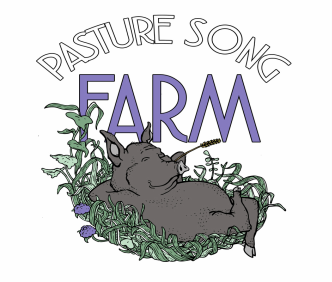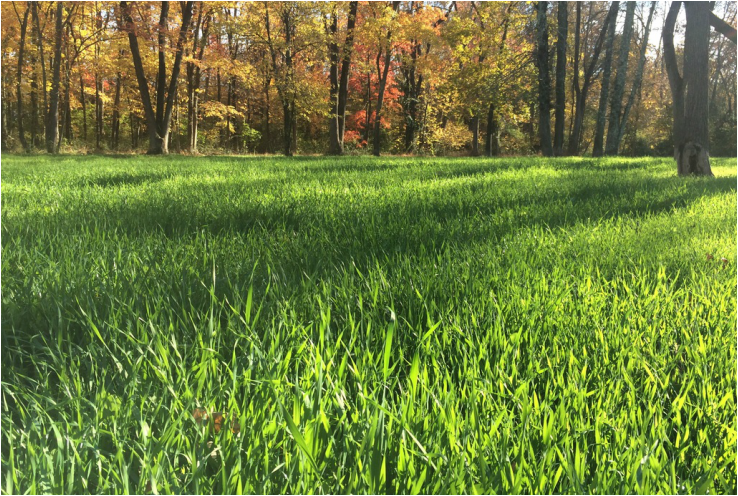"Commodity Farming is on its way out in the Northeast"...
Did I get your attention? This interesting perspective was one of many at the SE Pennsylvania Grazing Conference that I recently had the pleasure of attending. The conference, which was held in southern Lancaster County, is an annual event based on grass based livestock farming. This year's focus was marketing, and had an impressive line-up of speakers including Allan Nation, editor of Stockman Grass Farmer, the Van Amburghs, of Dharma Lea Farm, Sarah Flack, grazing consultant, and more. I have to admit it was surreal to see these speakers in my hometown of Quarryville, at one of the buildings at the Solanco fairgrounds! I was thrilled.
Here are some brief phrases from Allan Nation, pertinent to small farms, for you to ruminate on (none of them are direct quotes):
~Small farms must do what large farms cannot. (I.e. direct market, value added products, raise heirloom variety vegetables and slower growing heritage breeds, etc)
~Product differentiation is essential... Give people what they cannot get
~90% of good food is ingredient quality
~Foods with health stories were the only food items that kept growing during the recession
~Buying is 90% emotional, 10% critical thinking
~Consumers are the judge, jury, & executioner!
~Fat is where the flavor is! So meat and milk must have a good amount of fat to taste good!
The conference imbued a feeling of hope and opportunity, despite the current challenges that farmers face. Yes, commodity farming is becoming less and less profitable per acre. Yes, we are beginning to feel the consequences of climate change, with weather fluctuations becoming increasingly unpredictable and extreme. Yet these challenges must be seen as opportunities in order for us to survive and thrive, and the conference speakers focused on this.
How are these challenges opportunities? I think it boils down to the nature of our farming. Grass-based livestock farming is one of the most effective ways to sequester carbon and build organic matter (carbon) in the soil. It creates resilient soils, more capable of thriving in fluctuating weather. Grass based farming produces healthier animals and thus healthier, nutrient dense meat and milk. It is the solution on many fronts, and this is the story grass farmers must be telling, the story that will help build a solid customer base, even during hard economic times. What could be better than that?
Did I get your attention? This interesting perspective was one of many at the SE Pennsylvania Grazing Conference that I recently had the pleasure of attending. The conference, which was held in southern Lancaster County, is an annual event based on grass based livestock farming. This year's focus was marketing, and had an impressive line-up of speakers including Allan Nation, editor of Stockman Grass Farmer, the Van Amburghs, of Dharma Lea Farm, Sarah Flack, grazing consultant, and more. I have to admit it was surreal to see these speakers in my hometown of Quarryville, at one of the buildings at the Solanco fairgrounds! I was thrilled.
Here are some brief phrases from Allan Nation, pertinent to small farms, for you to ruminate on (none of them are direct quotes):
~Small farms must do what large farms cannot. (I.e. direct market, value added products, raise heirloom variety vegetables and slower growing heritage breeds, etc)
~Product differentiation is essential... Give people what they cannot get
~90% of good food is ingredient quality
~Foods with health stories were the only food items that kept growing during the recession
~Buying is 90% emotional, 10% critical thinking
~Consumers are the judge, jury, & executioner!
~Fat is where the flavor is! So meat and milk must have a good amount of fat to taste good!
The conference imbued a feeling of hope and opportunity, despite the current challenges that farmers face. Yes, commodity farming is becoming less and less profitable per acre. Yes, we are beginning to feel the consequences of climate change, with weather fluctuations becoming increasingly unpredictable and extreme. Yet these challenges must be seen as opportunities in order for us to survive and thrive, and the conference speakers focused on this.
How are these challenges opportunities? I think it boils down to the nature of our farming. Grass-based livestock farming is one of the most effective ways to sequester carbon and build organic matter (carbon) in the soil. It creates resilient soils, more capable of thriving in fluctuating weather. Grass based farming produces healthier animals and thus healthier, nutrient dense meat and milk. It is the solution on many fronts, and this is the story grass farmers must be telling, the story that will help build a solid customer base, even during hard economic times. What could be better than that?


 RSS Feed
RSS Feed